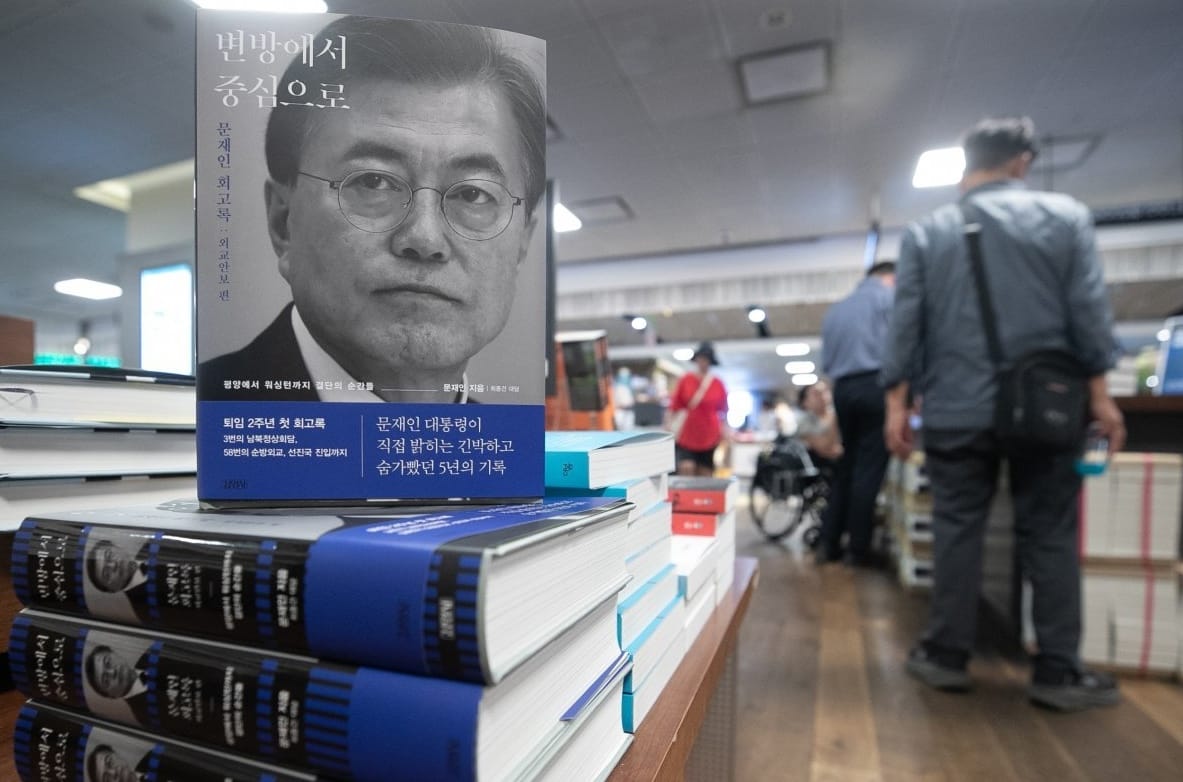Moon Memoir Revelations, Korea-US Space Ties Deepen, Seoul Moves on AI Governance
Moon's Memoir Sheds Light on North Korea Summits and Diplomacy, U.S.-South Korea Space Ties Reaches New Level, South Korea Aims to Shape Global AI Governance at Seoul Summit

Moon's Memoir Sheds Light on North Korea Summits and Diplomacy
Former President Moon Jae-in's newly released memoir "From the Periphery to the Center" is making waves with its behind-the-scenes accounts of his historic summits with North Korean leader Kim Jong-un and efforts to advance inter-Korean dialogue and denuclearization. The memoir, based on interviews with former Vice Foreign Minister Choi Jong-kun, offers a candid look at Moon's personal interactions with Kim, the challenges and missed opportunities in the diplomatic process, and Moon's assessment of the current state of inter-Korean relations.
Among the key revelations, Moon recounts Kim's stated commitment to denuclearization, with the North Korean leader reportedly saying he had "no intention to use nuclear weapons" and did not want his "daughter's generation to live with nuclear weapons over their heads." Moon also shares details of Kim's desire to visit South Korea, including Mount Halla on Jeju Island and even Yeonpyeong Island, which was shelled by North Korea in 2010, to console the residents.
The memoir tells of the logistical and security challenges in arranging the summits, as well as the personal rapport Moon sought to build with Kim. Moon expresses regret over the breakdown of the Hanoi summit between Kim and then-U.S. President Donald Trump in 2019, which he attributes to the "obstruction" of Trump's aides. He also laments the missed opportunity to include a "both stop" agreement, trading a halt to North Korea's nuclear and missile tests for a suspension of U.S.-South Korea joint military exercises, in the Singapore summit declaration.
While acknowledging the current impasse in inter-Korean relations, Moon defends his approach of engagement and argues that the only way forward is for South Korea to "take the lead in inter-Korean dialogue" and use it to drive U.S.-North Korea talks. He criticizes the Yoon Suk-yeol government's "excessively ideological attitude" and lack of effort to de-escalate tensions through dialogue.
The ruling People Power Party (PPP) has wasted no time in attacking Moon over the memoir, accusing him of still being unable to break free from his role as a "spokesperson for Kim Jong-un." PPP lawmakers have slammed Moon's "naivety" in trusting Kim's denuclearization pledges over objective evidence of North Korea's continued nuclear and missile development.
The ruling People Power Party (PPP) has wasted no time in attacking Moon over the memoir, accusing him of still being unable to break free from his role as a "spokesperson for Kim Jong-un."
Other PPP lawmakers have dismissed Moon's assessments as distorted and self-serving, questioning the timing and motivations behind the memoir's release. They have called for accountability and investigations into Moon's North Korea policies, which they blame for enabling Pyongyang's nuclear and missile advancements.
The PPP has also pushed back against Moon's criticism of the Yoon government's harder line on North Korea, arguing that a principled and firm approach is needed to counter the North's provocations and pressure it back to the negotiating table. They accuse Moon of undermining the government's stance and sowing divisions at a time when national unity is needed.
Moon's memoir has put a spotlight on the current state of inter-Korean relations, which have deteriorated to one of the lowest points in recent years amid a breakdown in dialogue, North Korea's escalating weapons tests, and heated rhetoric from both sides. The gap between the two Koreas' positions and approaches appears wider than ever, with little prospect for a quick resumption of meaningful engagement.
The memoir is likely to further polarize the domestic political debate over North Korea policy, with conservatives using it to discredit Moon's legacy and progressives defending his efforts as laying the groundwork for future diplomacy. The public, fatigued by years of tensions and failed talks, may become more skeptical and disengaged from the issue.
At the same time, Moon's reflections serve as a reminder of the importance of personal relationships, patience, and creative thinking in dealing with the complex challenge of North Korea. His call for South Korea to take the initiative in driving the diplomatic process, while maintaining a strong deterrence posture, could resonate with those seeking a more balanced and proactive approach.
Looking ahead, the prospects for resumed U.S.-North Korea peace diplomacy remain uncertain, with the Biden administration focused on other priorities and Pyongyang showing little interest in returning to talks without significant concessions. The upcoming U.S. and South Korean elections could bring a shift in approach, but any new initiatives will have to grapple with the reality of North Korea's advancing nuclear capabilities and the erosion of trust on all sides. While Moon's memoir offers new details and grist for political arguments, it also underscores the multi-decade challenges and dilemmas that confront current and future leaders in the pursuit of stability and inter-Korean reconciliation.
U.S.-South Korea Space Ties Reach New Heights
South Korea's space program is set for a major boost as it deepens cooperation with the United States, a key ally and partner in space exploration and utilization. The two countries are expanding collaboration in areas ranging from space science and technology to lunar exploration and space situational awareness, leveraging their complementary strengths and shared interests in the peaceful and sustainable use of outer space.